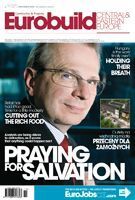Are the good times over for retail developers? ‘Eurobuild CEE’ spoke to Yann Guen, board member of Mayland Real Estate, and Tomasz P. Matusiak, director of Multi Development, who are both convinced that this is still a long way awayEmil Górecki, ‘Eurobuild CEE’: Have your companies suffered at all from the problems generated by the crisis on the financial markets?Yann Guen, Mayland Real Estate: “Suffered” is an exaggeration. Rates of return have increased slightly, which affects those operators who have to sell their projects. Financing has become quite
a headache and it may become rather difficult to obtain loans, while the loan-granting procedure itself will take longer. There are still many investors with capital to spend and wanting to invest it in property. And there are also those, like ourselves, who believe in the market’s potential and still want to develop. Real estate is a very safe place to invest. The trouble lies in-between: how to belie




























































